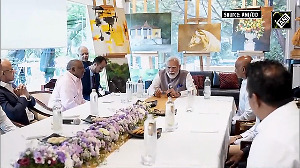In a statement, the embassy said mission personnel will limit nonofficial travel during the next two days and urged Americans to keep "a high level of vigilance." The statement did not elaborate on the nature of the threat.
"The American Embassy in Riyadh advises all American citizens living in Saudi Arabia that, in response to a threat against US government buildings in the kingdom, the US Embassy in Riyadh and the US consulate generals in Jeddah and Dhahran will be closed on Aug. 8 and 9," the statement said.
It reminded Americans that, in the past, terrorist groups have targeted housing compounds and other establishments where Westerners may be located.
"American citizens are ... advised to exercise caution and maintain good situational awareness when visiting commercial establishments frequented by Westerners or in primarily Western environments," the statement added.
Hours after the announcement, a Saudi Interior Ministry spokesman, Maj. Gen. Mansour al-Turki, said his government had no information about a possible threat.
"We can't dispel the possibility of a terrorist attack happening in the region. But we have no information about an imminent terrorist attack in the kingdom," he said.
The US Embassy warning was the second in two weeks.
On July 25, the embassy warned Americans that militants likely were plotting new terror attacks in the kingdom. It said US military personnel stationed in Saudi Arabia had been instructed to suspend all off-duty leisure travel outside of their work or housing stations.
Australia on Monday warned its citizens not to travel to the country.
"We have received credible reports that terrorists are planning attacks," Australia's
Since May 2003, Islamic militants have carried out numerous suicide bombings, including on Western housing compounds, and kidnappings and have regularly battled security forces. The attacks have been blamed on al-Qaeda and its allies.
Meanwhile, Foreign Minister Prince Saud said Sunday that relations between the Saudi and US governments had improved tremendously since the attacks of September 11, 2001, in which 15 of the 19 hijackers were Saudis.
But, on the unofficial level, ties had not returned to the degree of trust that existed before the attacks, he said.
"The relationship has tremendously improved," Saud said at a news conference. "Whether it has returned to the same level as it was before in public opinion in the United States is debatable.
"We are doing everything that we can to help and encourage the trust that existed before between the two countries in public opinion."
Saud said Vice President Dick Cheney's recent trip to the kingdom to offer his condolences on the death of King Fahd "could only help" improve ties.
Relations between Riyadh and Washington suffered after the September 11 attacks masterminded by the Saudi-born Osama bin Laden. Some US officials blamed the kingdom's austere branch of Islam, known as Wahhabism, for encouraging hatred of the West, Christians and Jews.
Shaken Westerners start leaving Saudi
Saudi Arabia believed it was being unjustly blamed for the actions of bin Laden, who seeks to topple the Al Saud monarchy.
"The objective of the whole action of the terrorists in that horrendous act of murdering and mayhem of innocent people was to create this split," Saud said.






 © 2025
© 2025